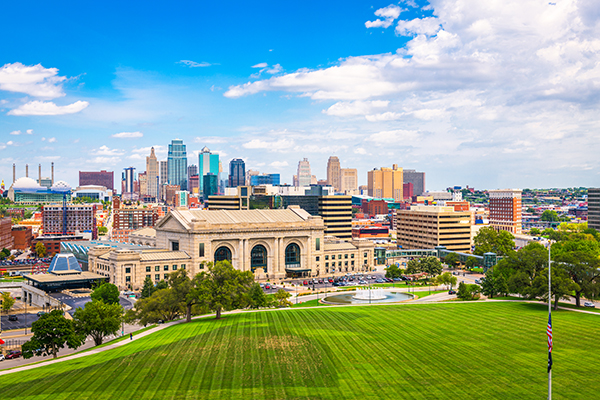Everything You Need to Know About Kansas City Roofing
Author: Dan Stout | April 26, 2024
Roofers working in the Kansas City region face a unique set of challenges and rewards. If you're a residential roofer starting up in Kansas City, you'll need to understand the policies of two different governments, provide roofs that can withstand Midwest temperature swings and be prepared for tornado season.

Two Cities, One Market
Most contractors know that building codes vary by state, county and municipality. But Kansas City is a metro area spanning two states. The result is that contractors working in Kansas City roofing need to be aware of requirements for any possible conflict on the state, city and county levels.
In Missouri, for example, a one- or two-family residential roof tear-off and replacement won't require a permit unless you're replacing more than 32 square feet of roof deck. If you go over that limit, you'll need a Kansas City, Mo., business license, as well as a permit. If you plan to repair or replace roof rafters, you'll need a Kansas City, Mo., residential contractor's license too.
In Kansas, you'll need to be registered with the state for jobs of any size. According to the 2013 Kansas Roofing Registration Act, every roofing contractor is required to be registered with the state.
The building code across Kansas City is fairly straightforward. As of March 2024, the building departments of both Kansas City, Mo., and Kansas City, Kan./Wyandotte County are using the International Residential Code (IRC) 2018. Note that Kansas City, Mo., does include a list of local amendments to the IRC.
What Residential Roofing Materials Are Best for Kansas City?
It's essential to select materials and installation best practices that protect homes from the high winds and turbulent storms of the Midwest.
Over the last 10 years, Kansas City has seen 100°F highs and -4°F lows. This range means that roofs need to withstand blistering sun, heaping snows and everything in between. But the biggest weather challenge to Kansas City roofing is tornado season. According to the National Weather Service, Kansas has had an EF3 or greater tornado in 63 of the last 74 years.
Ice and Water Shields
Ice and water shields are required on Kansas City roofs. Sitting between the roof material and the deck, these barriers guard against wind-driven rain and ice dams. Ice dams are formed as rooftop snow begins to melt. As the runoff hits colder air at the edge of the roof, it refreezes, creating an ice barrier that grows backward as more snow melts. Ice and water shields don't prevent an ice dam from forming, but they can keep water from penetrating the roof's sheathing.
Impact-Resistant Shingles
According to the Insurance Information Institute, Kansas had the third-highest number of major hail events in 2023, with a staggering 459 events with hailstones of 1 inch or more in diameter.
Help your roofs withstand hailstorms by installing impact-resistant roofing shingles. Look for shingles rated Class 4, which are the most impact-resistant.
Tornado-Resistant Shingles
Tornadoes damage roofs through impact (from blown debris) but also through winds so strong they can tear sections or entire roofs right off of homes.
The main concern is uplift, caused by high-speed winds hitting the side of a home, then traveling up the wall, pushing up on the bottom of the roof. ASTM D7158 classifies shingles based on how powerful of a wind they can resist. Class H shingles can hold strong against wind speeds up to 150 mph.
Go Beyond the Code for a Long-Lasting Roof
The local residential code is a minimum, and many homeowners are looking for durability that goes above and beyond this standard. Consider offering upgrades or standard practices that include a wider drip edge, fully adhered starter strip and use of ring-shank nails, all of which can provide better protection against storms, high winds and even tornadoes.
Optional standards such as the Insurance Institute for Business & Home Safety's FORTIFIED embrace all of those upgrades and more. Tiered standards also serve as sales tools, helping homeowners understand what they're getting for their additional investment.
Kansas City Roofing
Kansas City has been called "Paris of the Plains" due to its beautiful architecture. Whether you're working in KC's historic neighborhoods or on new builds, talk to your Beacon supplier to learn more about this city's roofing materials and styles. Consulting a Beacon Pro can help ensure your projects stay under budget and reduce your warranty calls.